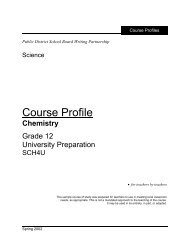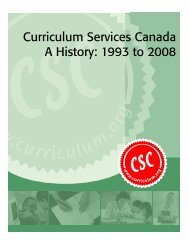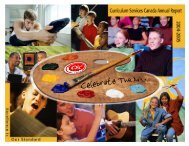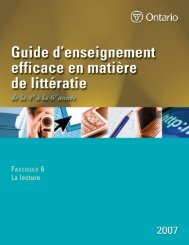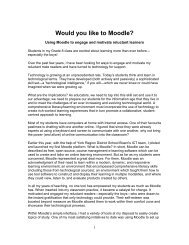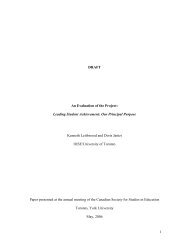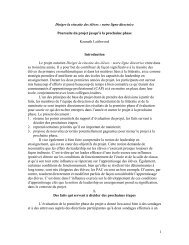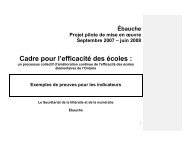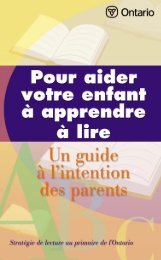Course Profile - Curriculum Services Canada
Course Profile - Curriculum Services Canada
Course Profile - Curriculum Services Canada
You also want an ePaper? Increase the reach of your titles
YUMPU automatically turns print PDFs into web optimized ePapers that Google loves.
esource people, physical resources, commercial enterprises and post-secondary institutions.<br />
These can also be resources for students planning for careers and further education.<br />
• The implementation of Grade 9 Science is a process, not an event. The program will take a<br />
number of years to become institutionalized in schools. Beginning in September 1999, it will be<br />
necessary that those involved at all levels in the education system make continuous and<br />
measurable progress towards the implementation.<br />
• Students who successfully complete Grade 9 Science, whether the Academic or the Applied<br />
course, may choose either course option in Grade 10. To ensure that all students have the<br />
necessary knowledge and skills to succeed in Grade 10, there is considerable similarity in the<br />
learning activities described for both the Academic and Applied courses.<br />
Teaching/Learning Strategies<br />
Most learning activities in this profile focus on the inquiry process, draw on scientific skills and<br />
concepts and are set in a context of science as it relates to technology, society and the environment.<br />
This approach is a significant, intentional change from past practice which tended to focus first on<br />
content, and is critical to the development of scientific literacy for all students. There has been a<br />
conscious effort to address the principles of best practice in instruction, as outlined below, in the<br />
student activities throughout this profile.<br />
Instructional strategies in Grade 9 Science:<br />
• include whole class, small group and individual instruction<br />
• promote the role of teacher as guide and facilitator in the classroom<br />
• use electronic technology in investigations as appropriate (including computer software,<br />
laboratory interface devices, calculators, video and digital cameras)<br />
• address a variety of learning styles in each unit<br />
• can be modified for special needs students<br />
• promote direct involvement in a variety of concrete experiences with the natural world which<br />
enable students to construct their own understanding of concepts and principles<br />
• provide challenging experiences appropriate to the needs of a broad spectrum of students<br />
• encourage maximum student engagement in the learning activities<br />
• encourage student choice regarding the processes and products of learning in the science<br />
classroom<br />
• provide opportunities for genuine inquiry - to generate questions, apply a variety of investigative<br />
approaches in learning, and communicate findings in a variety of ways<br />
• provide options which enable students to demonstrate Achievement Level 4<br />
• use formative assessment to provide opportunities for re-learning<br />
• link assessment tools to the expectations addressed<br />
• allow students to practise during the course tasks like those on which they will be assessed and<br />
evaluated<br />
• connect with expectations from other subject areas when appropriate<br />
• support opportunities for transfer – to solve problems and innovate by applying scientific<br />
concepts and processes to their lives outside the school and beyond the artificial boundaries which<br />
separate school subjects.<br />
Assessment/Evaluation<br />
Assessment is a systematic process of collecting information or evidence about student learning;<br />
evaluation is the judgment we make about the assessments of student learning based on established<br />
criteria.The assessment strategies in this profile support the view that assessment must be embedded<br />
within the instructional process throughout each unit rather than being an isolated event at the end.<br />
In that view, assessment drives the course and each activity within it. Making the details of the<br />
• Science, Academic Page 9



